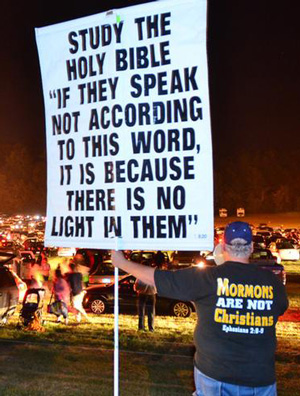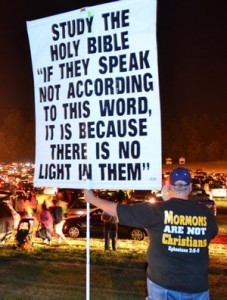 Somehow, through the centuries and millennia of history, religious folk have gotten the notion that the supreme goal of their spiritual pursuit is to know the right answer—to find and know the Truth. With a capital ‘T’.
Somehow, through the centuries and millennia of history, religious folk have gotten the notion that the supreme goal of their spiritual pursuit is to know the right answer—to find and know the Truth. With a capital ‘T’.
Certainly a goal of spiritual hunger is to find answers, enlightenment, and ‘truth’.
But just what that means—”What is truth?”, to quote Pontius Pilate—has been, and continues to be, the cause of such great fracture.
The Focus Is Wrong
If you take a photo of someone, but somehow you focus on the background rather than the subject (the person), you end up with a picture of the wrong thing. What you intended to capture is blurry and secondary, while the extraneous surrounding is what your eye is drawn to. The intended subject is still present, but it’s secondary and you must look hard to find it.
Truth is certainly important. You can do a search through Scripture right now for the word “truth” and, my goodness, the results are plentiful!
But Jesus said:
“You search the Scriptures because you think they give you eternal life. But the Scriptures point to me!”—John 5:39
And…
“Jesus told him, “I am the way, the truth, and the life. No one can come to the Father except through me.”—John 14:6
Jesus spells it out: he is Truth. Truth is not a concept, or a list of correct answers, doctrines, beliefs, practices—it’s a person. The person of Jesus.
His Kingdom is so much less about the what (what we should or shouldn’t do) or the where (church, temple, Israel, etc.) and so much more about the whom (God, others) and the why (because he loves us).
Arguments
But we keep making “truth” about what we know, and especially our interpretations of it, don’t we?
Why do you think there are so many religions? How about just within Christianity? There are approximately 41,000 organizations who call themselves Christians, but separate themselves as “different” from the other 40,999.
We make our differences much more important than what we hold in common.
¡Ay, ay, ay!
The words Paul wrote to Timothy would be helpful to folks today who argue over “truth”:
Again I say, don’t get involved in foolish, ignorant arguments that only start fights. A servant of the Lord must not quarrel but must be kind to everyone, be able to teach, and be patient with difficult people. Gently instruct those who oppose the truth. Perhaps God will change those people’s hearts, and they will learn the truth.—2 Timothy 2:23-25
The point is that we need to care much less—almost to the point of not caring—about being right and much more about living as greatly loved children of God, loving his other children—and I mean all of them. (Whether or not we agree with them. On anything!)
When we are “right” it makes us smug, self-righteous, and somehow “different” than “them”. Which is not how it is. We are all in the same boat. All in need of grace. All made in the image of God. And all given the ability to freely choose to know him, or not. (And the best part might be that He himself doesn’t seem to be in as much of a rush for us to “get it right” as most people who identify themselves by his name!)
What It’s All About
I read a blog post this morning at Donald Miller’s blog (by a guest author) that ended with this paragraph:
Amazing grace binds us with its simple message that keeps us together. Despite our differences, we are a people tied to each other in love. So we will keep singing “Amazing Grace” and we keep kneeling in the waters of grace so we can always love one another.
The author told the story of how she always thought better of herself for her distinguished taste in music for not liking the song Amazing Grace. However, in one moment when she saw that through the song community/unity was experienced and enjoyed, it was an epiphany for her of what really matters. Not the “truth” of a song’s worth, but each other, and sharing and celebrating what we have in common—made possible through grace.
You see, that’s what this is all about.
We can either hold our ground and fight for “the truth”, OR, we can accept the Truth that God loves every person he created, more than we can possibly imagine, and it’s not our job to change them, convert them, save them, or even condemn them. That’s all his job. We are just to surrender ourselves completely to him, follow him, and as he leads, use every opportunity he places before us to love other people as we ourselves have been loved.
That’s really it.
It’s not about whether baptism saves you, or if you’ve received the gift of the Holy Spirit, or if Allah is the same God that Christians worship, or if Mormons are Christians. It’s not about when and how Jesus will return, whether you are “Once Saved, Always Saved”, free will or predestination.
It’s about loving God (because you are loved) and loving others.1
In Ephesians, Paul exhorts the believers there to be united, despite their differences. I love the line from early in that chapter, “Be patient with each other, making allowance for each other’s faults because of your love.” Perfectly said, and oft-repeated in our home.
Listen to how he concludes those thoughts:
Get rid of all bitterness, rage, anger, harsh words, and slander, as well as all types of evil behavior. Instead, be kind to each other, tenderhearted, forgiving one another, just as God through Christ has forgiven you.—Ephesians 4:31-32
Yes. Please. Let’s do.
Sometimes We ‘Get it Right’
Now go get a box of tissues, and read this article. 21 Pictures That Will Restore Your Faith In Humanity.
Sometimes we transcend the “need to be right” and cross boundaries that we’re “not supposed to cross”, and we just love. Really love.
I believe, that’s who we are meant to be.
We’re not meant to be the ones who are Right. We are meant to know the One who makes Right.
I rediscovered a very related (and pretty funny!) post from this blog’s past. If you have the interest and time to read more, please read Be A Christian!! And, somewhat related: check out this post from even longer ago!




 “You’re a human being, not a human doing!”
“You’re a human being, not a human doing!” Not that I have any real force behind this open letter to every person on the planet, but it’s what’s on my heart today. For so long, those who claim to know and live for God have been such a harmful representation of him (myself included) that many people wrongly dismiss their rightful place as a beloved, treasured son or daughter of the Creator of the universe.
Not that I have any real force behind this open letter to every person on the planet, but it’s what’s on my heart today. For so long, those who claim to know and live for God have been such a harmful representation of him (myself included) that many people wrongly dismiss their rightful place as a beloved, treasured son or daughter of the Creator of the universe. Just about a week ago, the Supreme Court of the United States (SCOTUS) was in the news for two rulings in regards to same-sex marriages. One was specific to California (Proposition 8), and I won’t address that here, but the first was regarding a case challenging the constitutionality of section three (§3) of the Defense of Marriage Act (
Just about a week ago, the Supreme Court of the United States (SCOTUS) was in the news for two rulings in regards to same-sex marriages. One was specific to California (Proposition 8), and I won’t address that here, but the first was regarding a case challenging the constitutionality of section three (§3) of the Defense of Marriage Act ( “Yes, Jesus loves me… The Bible tells me so!”
“Yes, Jesus loves me… The Bible tells me so!” Imagine with me, please, that we are all free. There’s nothing to prove—ever.
Imagine with me, please, that we are all free. There’s nothing to prove—ever.
